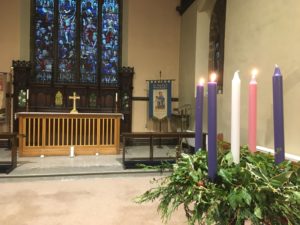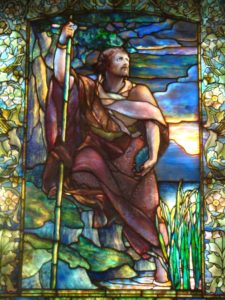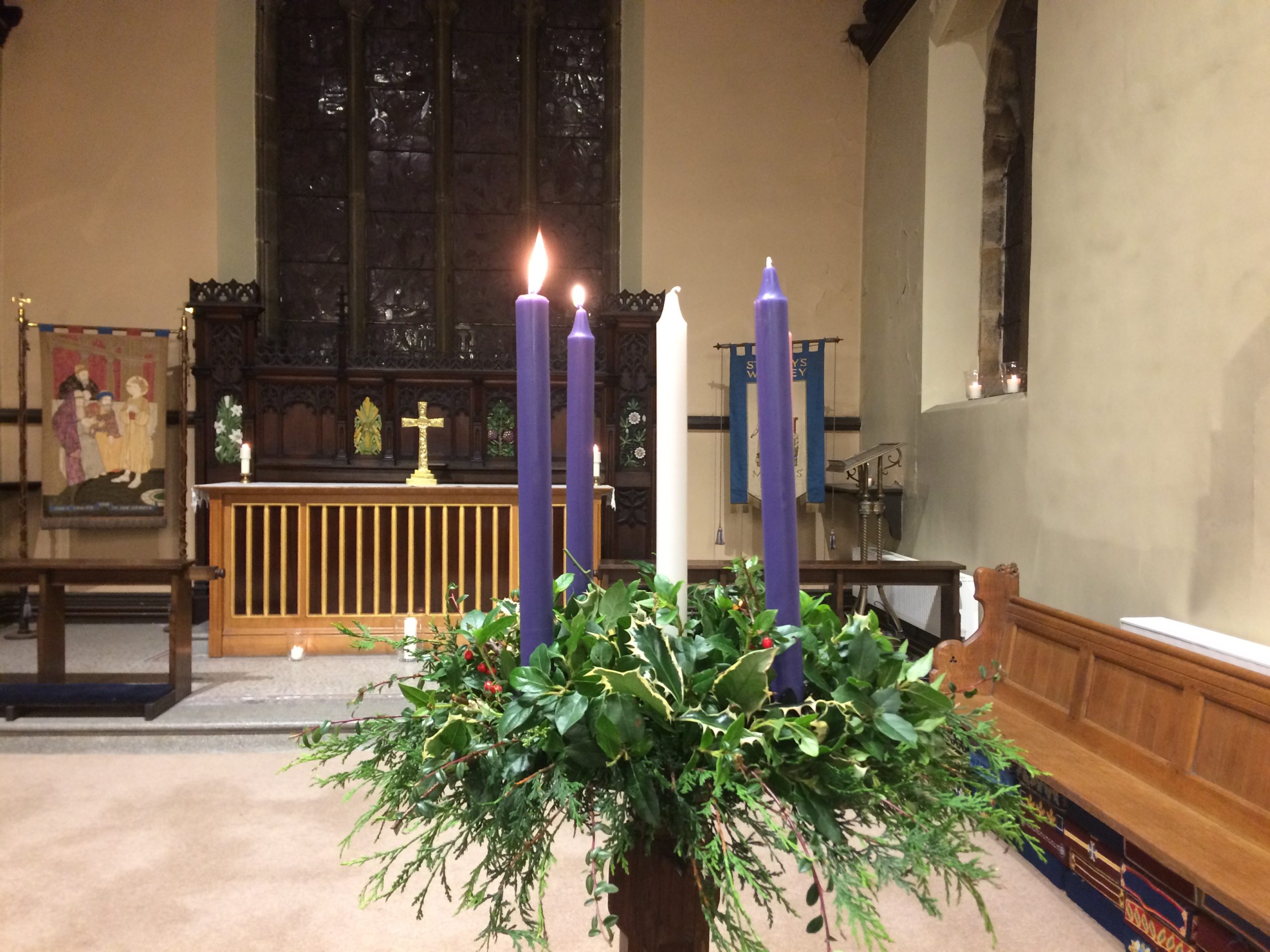Welcome to our Sunday Eucharist
To watch our service on YouTube, please click here:
https://tiny.cc/walkleystmary-youtube
To download a copy of the order of service, please click here:
The Readings
1 John 1.1-end
We declare to you what was from the beginning, what we have heard, what we have seen with our eyes, what we have looked at and touched with our hands, concerning the word of life— this life was revealed, and we have seen it and testify to it, and declare to you the eternal life that was with the Father and was revealed to us— we declare to you what we have seen and heard so that you also may have fellowship with us; and truly our fellowship is with the Father and with his Son Jesus Christ. We are writing these things so that our joy may be complete.
This is the message we have heard from him and proclaim to you, that God is light and in him there is no darkness at all. If we say that we have fellowship with him while we are walking in darkness, we lie and do not do what is true; but if we walk in the light as he himself is in the light, we have fellowship with one another, and the blood of Jesus his Son cleanses us from all sin. If we say that we have no sin, we deceive ourselves, and the truth is not in us. If we confess our sins, he who is faithful and just will forgive us our sins and cleanse us from all unrighteousness. If we say that we have not sinned, we make him a liar, and his word is not in us.
John 21.19b-end
(Jesus said this to indicate the kind of death by which he would glorify God.) After this he said to him, ‘Follow me.’
Peter turned and saw the disciple whom Jesus loved following them; he was the one who had reclined next to Jesus at the supper and had said, ‘Lord, who is it that is going to betray you?’ When Peter saw him, he said to Jesus, ‘Lord, what about him?’ Jesus said to him, ‘If it is my will that he remain until I come, what is that to you? Follow me!’ So the rumour spread in the community that this disciple would not die. Yet Jesus did not say to him that he would not die, but, ‘If it is my will that he remain until I come, what is that to you?’
This is the disciple who is testifying to these things and has written them, and we know that his testimony is true. But there are also many other things that Jesus did; if every one of them were written down, I suppose that the world itself could not contain the books that would be written.
Scripture Quotations are from New Revised Standard Version Bible: Anglicized Edition, copyright © 1989, 1995 National Council of the Churches of Christ in the United States of America. Used by permission. All rights reserved worldwide. http://nrsvbibles.org
The Sermon
by Joe, a Reader at St. Mary's
Back in the early 1970s, we in the UK were pretty used to power cuts. I remember doing homework by candle-light, but as I was interested in astronomy the opportunities to see the night sky without light pollution was amazing. One evening, in a power cut and with a clear and pitch black sky, I popped outside with a pair of binoculars and found my target; a faint grey smear of light, barely visible to the naked eye. The Andromeda galaxy. That faint smear of light had taken 2 million years to get to my eye – it’s the farthest away object you can see with your naked eye.
In the darkness – even the faintest light can be seen. Even in a two million year journey, the light is not overwhelmed by the darkness.
This year has been a hard year for everyone, and it’s sometimes hard to see the light in the darkness.
This morning’s reading from the first Epistle of John includes the words:
“This is the message we have heard from him and proclaim to you, that God is light and in him there is no darkness at all.”
John gives us a rule for discerning the presence of God; that God is light, and that in Him there is no darkness.
So, what can we draw from John’s words?
Well, if God is light without darkness, and we live in a world where we are surrounded by and assaulted by darkness, it suggests that we have to be able to differentiate between God’s will and the way in which the world unfolds. John’s already told us what the light looks like – it’s Jesus Christ
John goes on to say:
“If we say that we have fellowship with him while we are walking in darkness, we lie and do not do what is true”
We walk in the darkness by turning away from God and Jesus. All of us have moments in our lives like that, when we follow our own wills rather than God’s will. Some people make use of this statement to suggest that God might use things we associate with darkness – death, pain, disease, natural disasters – to punish us to bring us in to line with his will. But as John says “in him there is no darkness at all” – this is not the way that God works; God works with all things to achieve his ends, but not all things are his works.
It may be hard to take this on under the circumstances that we find ourselves in now, and certainly in the circumstances that humanity finds itself in across the planet and across our history. Where was God at Belsen? During the great plagues of history? During the Thirty Years War? At Hiroshima and Dresden?
We currently cope with an illness that has turned our lives upside down; love can no longer be expressed by touching, hugging or kissing. We keep our distance from each other, and we are parted from our loved ones at the moment of death. The world often seems to be a dark place; even when we try to walk in God’s light as Christians, we are surrounded by darkness.
The darkness surrounds us but does not overwhelm us as long as we have faith. It’s easy to feel despairing in the modern world, that we are all sinners, that the world is full of pain. It’s easy to get in to thinking ‘What’s the point?’.
And John reminds us that we are indeed sinful; if we try to deny it, we’re fooling ourselves and the truth of God is not in us. But if we confess our sins, if we walk in the light with God and in companionship with each other, our sins will be forgiven and we will be cleansed by the blood of Christ.
The darkness around us in the world reminds us that there is a gap between the will of God and how things are being played out here on Earth. We pray that God’s will be done, on Earth as it is in Heaven, because it ISN’T being carried out on Earth!
For us, that prayer cannot be just words. It must also guide us in what we do in the world. We must do what we can to ensure God’s will is carried out in OUR little bit of the Earth to the best of our ability.
When we come face to face with our Lord, we would all be hoping to hear the words from Matthew 25:23: “Well done, good and faithful servant.” Note that Jesus doesn’t say “Well done, good and successful servant” or “Well done, good and perfect servant.” We are expected to be faithful, that is all – and that’s really as much as we can manage.
Now, what does faithful mean in times like this, especially in the light of the reading this morning from John’s epistle?
It is to accept that we are sinners, confess those sins, love one another and walk in God’s light in the world, no matter what the darkness is around us.
It is to do our best to follow our Christian vocation and allow others to see and detect the presence of God in the world, and to bring the light of God to others who still may find themselves in darkness.
And it takes a such a small amount of light from us to drive back the dark; after all, the darkness cannot even extinguish a tiny light that is two million years old.
Leonard Cohen, the Canadian song writer, says in his song ‘Anthem’:
“Ring the bells that still can ring,
Forget your perfect offering
There is a crack, a crack in everything
That's how the light gets in”
In these strange times, we may not be able to sing together, but we still have some bells; our offerings of prayer and praise, and our way of celebrating the sacraments, may not be a perfect offering, but our efforts and our faithful presence as God’s people provide the means by which we let in the light of God to our lives and the lives of those around us.
“God is light; and in Him there is no darkness at all.”
May I take this opportunity to say “Merry Christmas and God bless all of us, all of us on this good Earth.”
Amen
The Prayers
prepared by Joe
With thankful hearts we bring our prayers to our heavenly Father.
As we celebrate the birth of our Lord, we pray for His Church throughout the world. We for our Archbishops Justin and Stephen, for Bishop Pete and Bishop Sophie, all here who lead us in worship and prayer, and all those whose time and talents are given to St Mary’s.
Help us to be lights in the darkness for those around us during these difficult times.
Lord, have mercy.
Christ, have mercy.
We pray for all those in authority, and those who have influence in the world, that their power and voices be used compassionately for the good of all. We thank you for the efforts of all those involved in the agreement of the UK-EU Trade deal, and ask that the transition of power in the United States takes place smoothly and peacefully.
Lord, have mercy.
Christ, have mercy.
We pray for our community here in Walkley, and for the city of Sheffield, and for our neighbours and friends. As our communities once again face a threat from Covid 19, help all of us to work together for the good of all. We thank you for the skills and knowledge that scientists and medical staff have been able to use to develop treatments and vaccinations for this illness.
Lord, have mercy.
Christ, have mercy.
We pray for the aged and infirm, and those sick in mind, body or spirit, those that need your grace and blessing. We pray that God’s power and spirit will strengthen them and bring them the healing and peace that belong to Christ’s kingdom. We pray for all those who are feeling isolated and lonely at this time.
Lord, have mercy.
Christ, have mercy.
We pray for those close to death, and those accompanying them on this final part of their Earthly journey. We pray for those who have died, recently and in the past, and those who mourn. We pray for those who have died without the comfort of their family around them, that they were comforted by your presence, Lord. We pray that you give strength and love to all those close to death and caring for the dying in this Christmas season.
Lord, have mercy.
Christ, have mercy.
Finally, Lord, we silently bring before you those special to us, and also those issues and concerns that we have in our own lives.
Lord, have mercy.
Christ, have mercy.
Rejoicing in the communion of Mary and of all the Saints, let us commend ourselves, and one another, and all our life, to God.
Merciful Father:
accept these prayers
for the sake of your Son,
our Saviour,
Jesus Christ.
Amen.
Common Worship: Services and Prayers for the Church of England, material from which is included here, is copyright (c) The Archbishops' Council 2000.





